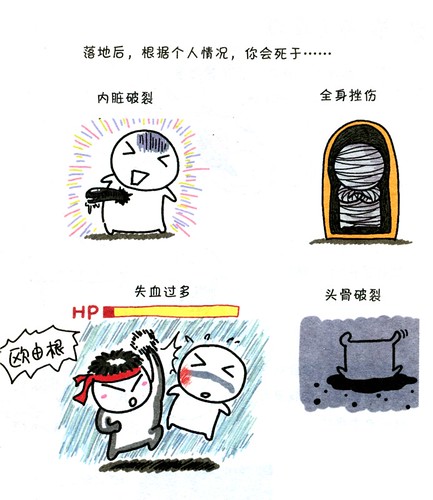The Chinese Shoryuken
Here’s another illustration from Black Back’s book, 我们丫丫吧:
Two nice pop culture references there, but interested in Chinese onomatopoeia as I am, I can’t help but fixate on the Street Fighter sound effect label: 欧由根. This especially amuses me because I remember when I was playing Street Fighter II in high school, my friends and I could never quite agree on what the heck Ryu was saying. We always thought it was something like “Har-yookin,” but apparently at least some of the Chinese hear it as “oh-yoogun.”
For those of you who have no idea of what I’m talking about, or only a very fuzzy recollection, this video, taken directly from the Street Fighter II video game, has plenty of sound bites for you:
Anyway, curious, I Baidu’d the phrase and, on a page about 我们丫丫吧, found some interesting stuff. I couldn’t help trying to decipher these:
– 欧由根: the classic shoryuken in the illustration above (see 0:11, 0:12, and countless other places in the video)
– 啊卢给: Hmmm, either it’s a hadouken (0:08), or it’s someone else’s move. (Anyone…?)
– 加加不绿根: the hurricane kick (0:54)?
If you’re Chinese and you used to play Street Fighter II, I’d love to hear what you used to hear the characters saying.
[Sorry for the excessive early 90’s nostalgia. All you people that liked the Teenage Mutant Ninja Turtle post, this is for you!]

I used to think it’s a duo gen and ha you gen. looks like I’m always the biggest fan of your blog.:)
He says 波動拳 (hadōken), which is the name of his move.
Yeah nevermind, I was clearly thinking of a different move.
I always thought he said “Ryu-Ken”. Ryu and Ken are basically the same character, so I thought it was a joke on the part of the makers of the game. Maybe not though. Man I used to play that game way too much.
Haha, great post.
I remember listening intently and trying so hard to figure out what they were saying. I couldn’t believe they were actually saying gibberish. It had to be something. (but certainly not another language)
Anyone remember how you could blast through the whole game by playing as E. Honda the Sumo and just tapping a single button over and over making him do the super slap thing? Totally unstoppable…
Interesting post. I just bought a small, graphic-novel-style Chinese manga called “Stella’ (“sidaile”) – about a woman working for a Joint Venture in Beijing (it’s interesting to read about her experience). I also bought Manga about different countries – translated from Korean into Chinese. It was an interesting, entertaining, and educational way to get the point of view of a Korean on the culture, history, and economy of Korea, Japan, China, and many countries in Europe. They are called “Comic Korea” (Manhua Hanguo) “Comic Japan” (Manhua Riben), (Manhua Faguo), etc. The author is Li Yuan-Fu (Rhie Won Bok in Korean). By the way, does anyone have any other recommendations for autobiographical graphic novels or educational manga in Chinese?
Haha, about 10 years back I used to hear that, as “abogame.” Greeeeeeeeeeeat post! 😉
I was thinking that when seeing the title. 😀
哦由根、啊多根、节节不路根 we say, oh btw, you can still see people saying it from time to time in KDS.
Kastner,
Ha, great examples… Thanks for contributing. 🙂
Ah, yes, the classic fighter game that started it all. I think if you really want to know what they are saying, you’d have to figure out what nationality the designers are. They had to be either Japanese or American. My guess is Japanese.
So, whatever they are saying is going to have sounds that are found in that language, right?
That upper cut is definitely either haryookin or aryookin. The chinese are hearing it wrong because their language is different 🙂